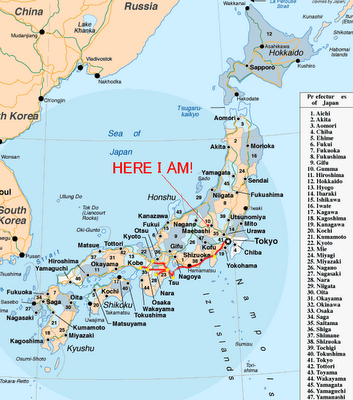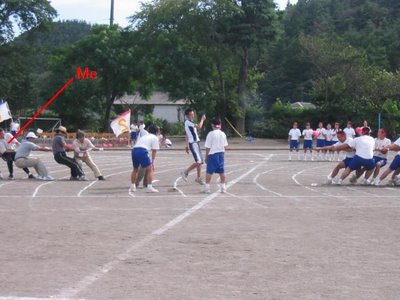
All riiiiight. Check out the pic in all its glorious goodness. I'll have to do that more often. I don't have any photos from my camera with me, I guess that'll just have to wait until Monday. For now, here's a teaser pic of the sports festival day at the Junior high school I work at. It was taken just yesterday. The ninth graders had a tug-of-war with the teachers and parents. The teachers and parents won - it was a little one-sided with the huge gaijin on their side. Here's to tipping the scales.

So. I guess I covered the basics of Shibukawa pretty well in my last posting. It's right on the edge of the Kanto plain, so there are mountains that are really pretty to hike in just a little bit West, in a town called Ikaho. Ikaho is also famous for its onsens (spas), which I will be sure to give a full report on when I experience them. I have yet to travel far outside the town - not having a car is a bugger, but what are you gonna do. Getting a driver's liscence is hell over here, especially if you're from a country that drives on the correct side of the road. I'm in the process, though. Thank goodness for rail, that's all I'm saying. It looks like this weekend is booked inside the town, though. Tell you what, when I finally go to Tokyo, I will give a full report.
There are about eight foreigners in the entire city, so I'm pretty darn conspicuous. However, I kind of stopped thinking about that after my first few weeks, in order to keep my sanity. In fact, it's a little surprising these days when I look in the mirror after a long day and see a non-Japanese person. I kind of do a double-take - "Hey, a gaijin. Weird."
So. On to question 2. What's Japan like? It's impossible to summarize it in one sentence, so I'll just start writing, I guess. To begin with, it's quite a bit like any Western country, but at about 5/6 scale. Everybody works hard to stretch everything - budgets, food, utilities, etc, and they do a good job, but it's still noticeable that there isn't as much of anything as there is in the States. Shoes are smaller, cars are smaller, meals are smaller, houses are smaller, desks and offices are smaller. Everything costs at least the same amount as in America, too.
However, what the Japanese lack in quantity, they make up for in quality. The average Japanese person takes so much pride in the little details of everything than I've noticed in America. You notice it everywhere - the construction workers making improvements to the Junior high school I work at don't stop until what they have done is flawless, in the paint and the smoothness of the concrete and everything. The workers at McDonald's are the fastest and friendliest I've ever seen, and each burger is a work of art. The other day, a woman apologized to me that her van was dirty, and if that were my car in the states, I would still expect people who rode in it to comment on how clean it was. Basically, everyone works as hard as they can to attain perfection. You have to respect that.
They get that drilled into them at an early age, too. At my Junior high school, the students are more or less expected to participate in about 2 hours of activities after classes every day. It's for the honor of the school and the good of the community, and it keeps the students active and working together. From what I've seen, morale is pretty high too. But as I say, it's more or less expected of them, and the students who don't live up to the expectations tend to get frowned upon, and start doing even more poorly because their morale is low. It's kind of a polarizing influence I think. Many things in Japanese culture and behavior are to separate the wheat from the chaff, and it's kind of rough to be the chaff. I think the Assistant Language Teachers (ALT's) who work in Japan have similar influences put on them, and some rise to it and some sink. I hope I can swim.
Well, it's kind of getting late, and I'm still at school. I'm calling it a day. More on Monday. Ja, ato de. (That means catch you later.)